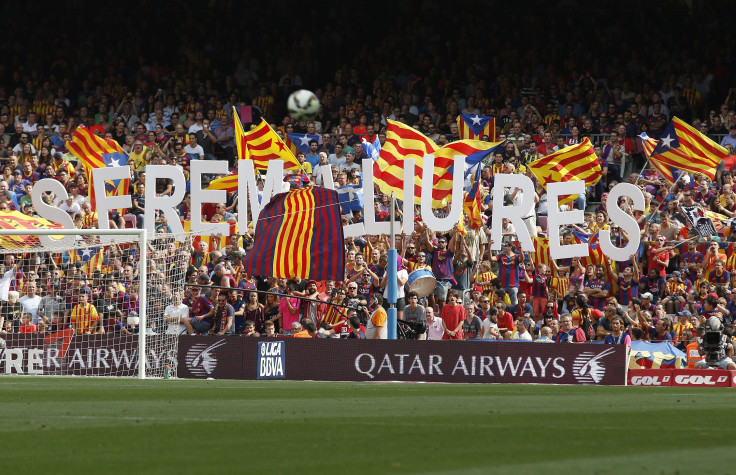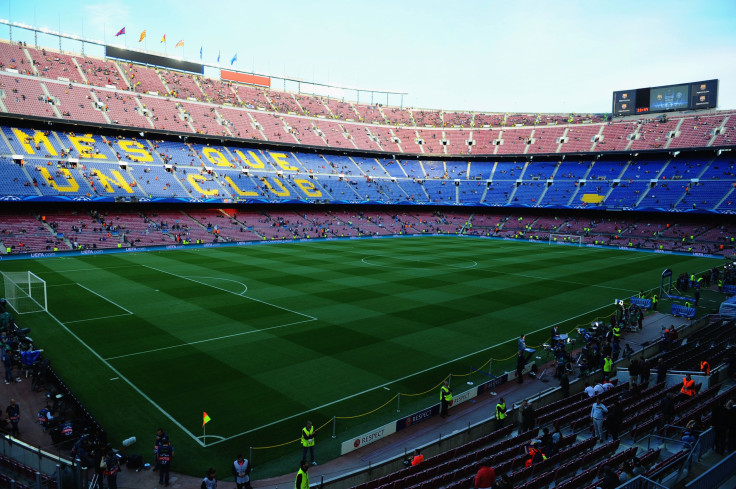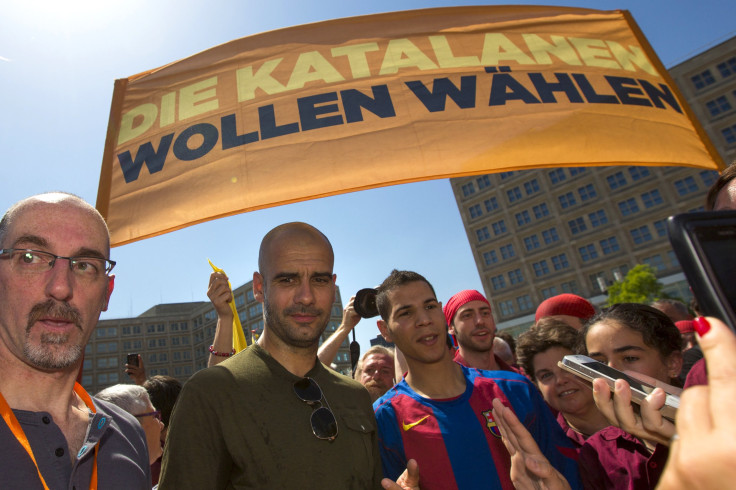Catalonia Independence Election: FC Barcelona, La Liga And The Uncertain Future Of Spain's Soccer Teams

Rattling the steel of FC Barcelona's goliath of a stadium, "Independencia! Independencia! Independencia!" regularly echoes throughout the Camp Nou grounds as swaths of Barca supporters, many donning Catalan flags, sing the ritual chant. The pulsating call for the break of their Catalonia region from the rest of Spain has been a tradition for years.
But over the past few months Catalonia, Spain's richest and second-most-populous region, has seen a renewed push to allow a referendum on independence. An election Sunday has been billed as a de facto vote on Catalan independence, and recent poll numbers suggest separatist parties could win a majority of seats in the regional parliament.
For soccer fans, a political shakeup in Spain -- and an independent Catalonia -- could send ripples throughout the world’s sport, leaving Spain's professional league, the Spanish national team and Catalan players scrambling to reassemble the pieces. With growing support for separatists, their rhetoric has taken on a new intensity in recent weeks, and in response, officials in Spain's Primera División, commonly referred to as La Liga or LFP, have warned that FC Barcelona could be forced out. Barca, located in Catalonia's capital, has long tiptoed the careful boundary between allowing for Catalan pride and recognizing La Liga's home nation, which has helped funnel countless millions to the organization. But should Catalonia become independent, it could forever change the game, throwing La Liga, Barcelona and international soccer into a state of flux.
A League Without Catalan Clubs
Javier Tebas, president of La Liga, warned Monday that Barcelona could not be in the league should Catalonia separatists succeed, saying it "would be a league without Catalan clubs," according to French news service Agence France-Presse.
Should separatist parties take power in Catalonia's parliament after Sunday's election, they have promised to push for a referendum on a breakaway from Spain and to become an independent nation within 18 months. Should that schism ever occur, experts are skeptical of the notion that Tebas and other officials would follow through with recent threats to push Barca out of La Liga.
Barcelona, side by side with superpower club Real Madrid, composes one-half of La Liga's duopoly atop the standings. In the past 10 seasons, Real Madrid and Barca have combined to win nine championships. Even more importantly, both clubs are worth many billions of dollars and regularly finish near the top of Forbes' sports team value rankings. The two squads have built perhaps the world's greatest rivalry, with every matchup dubbed "El Clásico," and along the way have piled -- for themselves and the league -- mountains of cash in television rights, merchandising and ticket sales.
"Barca and Real Madrid are so intertwined in their competition that the sudden negative-sum absence of Barca would lay waste to La Liga and adversely affect twin giant Real Madrid," John Vrooman, a sports economics professor at Vanderbilt University in Tennessee, wrote in an email. He mentioned that from 2016 forward, La Liga plans to adopt a common European strategy for divvying up television dollars by doling out 50 percent of the total through even revenue sharing and 50 percent based on merit.
"The critical absence of Barcelona will render the new TV deal and La Liga comparatively worthless," Vrooman said.

Tebas could follow through with his warning to Barca, in which he noted: "The law of sport is very clear: The only non-Spanish competitors are the Andorran clubs," referencing teams from the small nation between France and Spain. But other national leagues have allowed for teams outside their borders. Canadian teams play in the United States' Major League Soccer, AS Monaco plays in France's Ligue 1, and Welsh Cardiff City plays in England's Premier League, as does fellow Welsh squad Swansea City.
"Even if Catalonia were to be granted independence, it does not auto-mean La Liga would break apart," Victor Matheson, a sports economics professor at College of the Holy Cross in Worcester, Massachusetts, said. Every team, bitter rival Real Madrid especially included, is helped greatly by financial powerhouse Barcelona. And the league, one of the world’s most popular, is driven by the Barca-Madrid rivalry.
"They say the rules prohibit it," Matheson said. "You're the league! Rewrite the rules."
Should Catalonia gain independence, smaller clubs with far less on the line could still form a Catalan league if La Liga and Barca come to an agreement. But some have also suggested Barcelona, the team that concerns most soccer fans, could push to form a European superleague of sorts outside of national federations with giants like England's Manchester United, France's Paris Saint-Germain or Germany's Bayern Munich. It would be an unlikely endeavor to undertake but is an idea that has gained momentum through top clubs' easy dominance over domestic leagues. A homeless Barca could provide a spark.
"One of the big fears [of domestic leagues] is the big clubs breaking away and forming a superleague," said Bill L. Smith, director of the Martin Institute at the University of Idaho and a researcher who studies soccer and politics. "I could see this sort of thing furthering this push."
More Than A Club
For its part, Barca has treaded carefully. The club allows the Catalonia flags and chants for independence, which always come in the 17th minute in honor of the 1714 Siege of Barcelona, which ended a Catalan push for independence. But the organization has also purposefully taken a middle-ground stance in the past few weeks, despite further warnings of Barca's push out of the Spanish league from Miguel Cardenal, Spain's sports minister.
"We're not entering the campaign. We're staying out of it and have amply demonstrated as much. We understand Mr. Cardenal going on the campaign trail because he's a politician," said FC Barcelona President Josep Maria Bartomeu Monday, according to Spanish sports newspaper Marca. "Barca will stay neutral, as ever, on this score."

Barcelona has long been a symbol for Catalans, and the club has somewhat embraced that identity, calling itself "more than a club," and has at times worn Catalan-colored jerseys. The club crest even displays the Catalan flag. But Barca is more of a meeting ground and boiling kettle for separatist sentiment, rather than a driving force behind it.
"The club is a receptacle for it, not a beacon moving [the push for independence] forward," said prominent Scottish journalist Graham Hunter, who has lived in Barcelona for 14 years covering Spanish soccer. "I think they've been a flame to which moths are attracted, but the flame is kind of saying, 'Keep away.' ... They’ve been adept at not vociferously aligning themselves with the debate."
Hunter added that while officials like Cardenal or Tebas have aimed threats at FC Barcelona, the view from many Catalans involved in soccer is that these tactics amount to scaremongering and bullying. The fervor for independence remains unchanged.
A Giant Mess
While Barcelona's future could hinge on what feels like a game of chicken, Catalan players would have a clearer picture of what to expect in international play should Catalonia become an independent state. Should FIFA, international soccer's governing body, recognize Catalonia as a nation, players would likely have a one-time choice: Remain on the Spanish squad or join the Catalonia team. That was the blueprint followed at the fall of the Soviet Union, Matheson pointed out.
Many high-profile Catalan players already play on a Catalonia team that plays unofficial friendly matches. It's a squad comprising mostly world-class players, such as Gerard Piqué and Xavi Hernández. Catalan players have helped Spain to such an extent during international soccer that French soccer legend Eric Cantona quipped about the nation's first-ever World Cup win in 2010: "Spain did not win the World Cup; Catalonia did." The talent that helped Spain dominate in the early 2010s would likely be watered down if players jumped ship.

So far, Catalan players have engaged with the independence push to varying degrees. Hunter pointed to three players as models: hard-line independence campaigner Oleguer Presas, moderate Piqué, who has often shown pride in Catalonia, and Hernández, who sang Spain's praises after the World Cup win.
But with the push for independence gaining freshly invigorated support following a denied referendum last year, Catalan soccer figures increasingly have to deal with questions of independence. Piqué recently showed off a Catalonia flag after a match. But most notable of the bunch is coach Pep Guardiola, former Barcelona player and coach, and current manager of Bayern Munich. He has strongly backed the push for independence, calling it an eventuality while saying, "There is no turning back."
Figures like Guardiola, paired with Barca's international popularity, have broadcast the Catalan independence push. But should Catalonia ever gain independence, the massive club and entire sport will face imposing questions.
"It’d be a giant mess," Smith said. "Football has played this vital role in getting Catalonia to this point. … It may not [work out] if they actually gain independence."
© Copyright IBTimes 2025. All rights reserved.






















